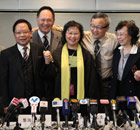Op-Ed Contributors
Keep Sino-US 'soft conflicts' under control
By Wang Wanzheng (China Daily)
Updated: 2010-02-04 07:48
 |
Large Medium Small |
About a month ago, I had a discussion with a friend in US studies on emerging Sino-US disputes in the climate change conference at Copenhagen. Don't believe these superficial phenomena, he said. This is a drama co-acted by China and the US. In other words, China and the US are pretending to be at odds to dismiss the international community's worries that the G2 is ruling the world.
The evidence that justify his opinions is the concept conveyed by US President Barack Obama that the Sino-US relation is one of the most important bilateral relations in the world. State Secretary Hillary Clinton once said that the two countries should "be in the same boat" to handle global issues, which also contributes to my friend's view.
If his drama theory were true, then it had been overthrown by the recent US policies regarding China. Obama has been consistently challenging Sino-US trade relations, which could trigger a trade war. This is a policy that seeks to contain the development of China. He also declared an arm sales deal to Taiwan, despite the fact that tension across the Straits has relaxed.
| ||||
Major General Peng Guangqian defines current Sino-US relations as a "smart war". In his view, the Obama administration is launching a war that "softly offends China while strongly defends the US."
Fransois Jelay, an expert of political geography and head of the Center for Strategic Analysis in France, summaries the US' new China policy as "soft containment".
Both the general and Jelay point out that this soft side of new Sino-US disputes is its flexibility of control and precaution. But I have to say, it is more important not to underestimate the general context of the coming Sino-US disputes.
Think about this from a global perspective. In the post-crisis era, the trend of an ideologically strong West and an ideologically weak East has significantly changed. The power and prestige of neo-liberal theory no longer exist, the "Washington Consensus" has lost its reputation, the American laissez-faire capitalism was forced into self-reflection. Following the burst of the financial bubble, the bubble of Western ideology is set to pop soon.
To reshape the image of the US and revitalize America's soft power has become Obama's fundamental imperative. At the same time, with its strength and international influence, China has put forward its own soft power strategy. President Hu at the eleventh Conference of Ambassadors clearly pointed out that China should be more influential in politics, more competitive with its economy and more friendly in image.
Consequently, what worries me most is that the soft conflicts between the US and China will burst eventually. The problem is whether the US' soft power revival and China's soft power strategy is a collision that can't be reconciled? The answer is absolutely, no.
For a long time, the West has ruled the world through three major hegemonies: Wealth, power and truth. The first two belong to areas of hard power, while the third is soft. Struggle for wealth and power is just like "dividing a cake". While competition for truth is just like "making a cake" - no matter if a country is from the West or East, strong or weak, it always has the right to pursue, transmit and share truths with other nations, and only by these means can mankind reach the peak of civilization.
The US has taken the lead in stirring up the soft conflict with China, attempting to defend the Western truth hegemony, but the global financial crisis has already proven that once civilization has been dominated by a state or a group, it will become the scourge of society.
To the US, the only correct choice is to emancipate the mind, release the hegemony of the monopoly of truth and sincerely promote dialogue between different civilizations, and create good fortune not only for the two nations, but for the planet.
The author is a post-doctoral scholar with the Central Compilation and Translation Bureau, and chief editor of Current Affairs.
(China Daily 02/04/2010 page8)













